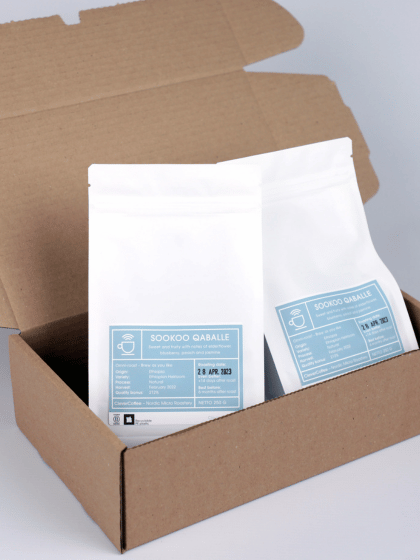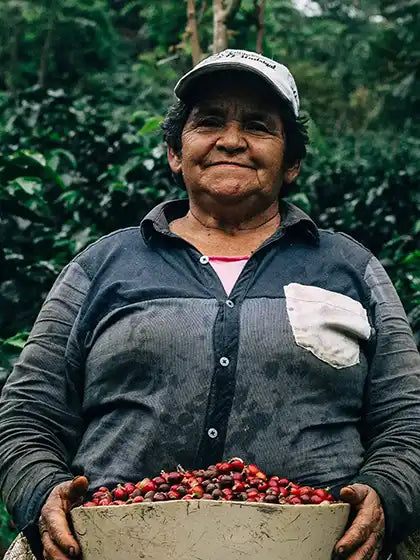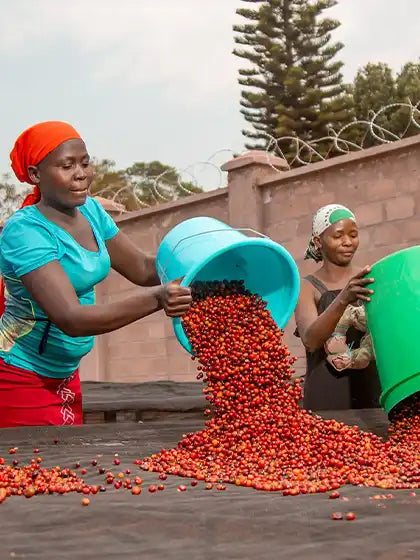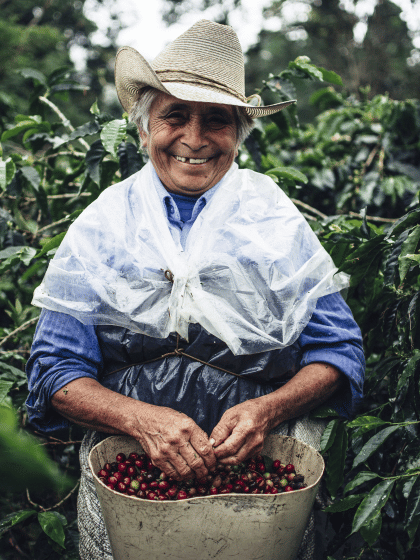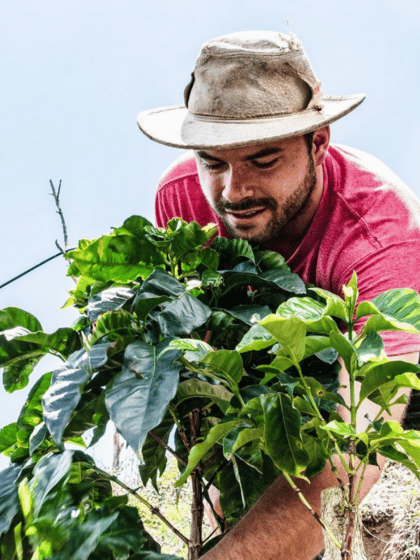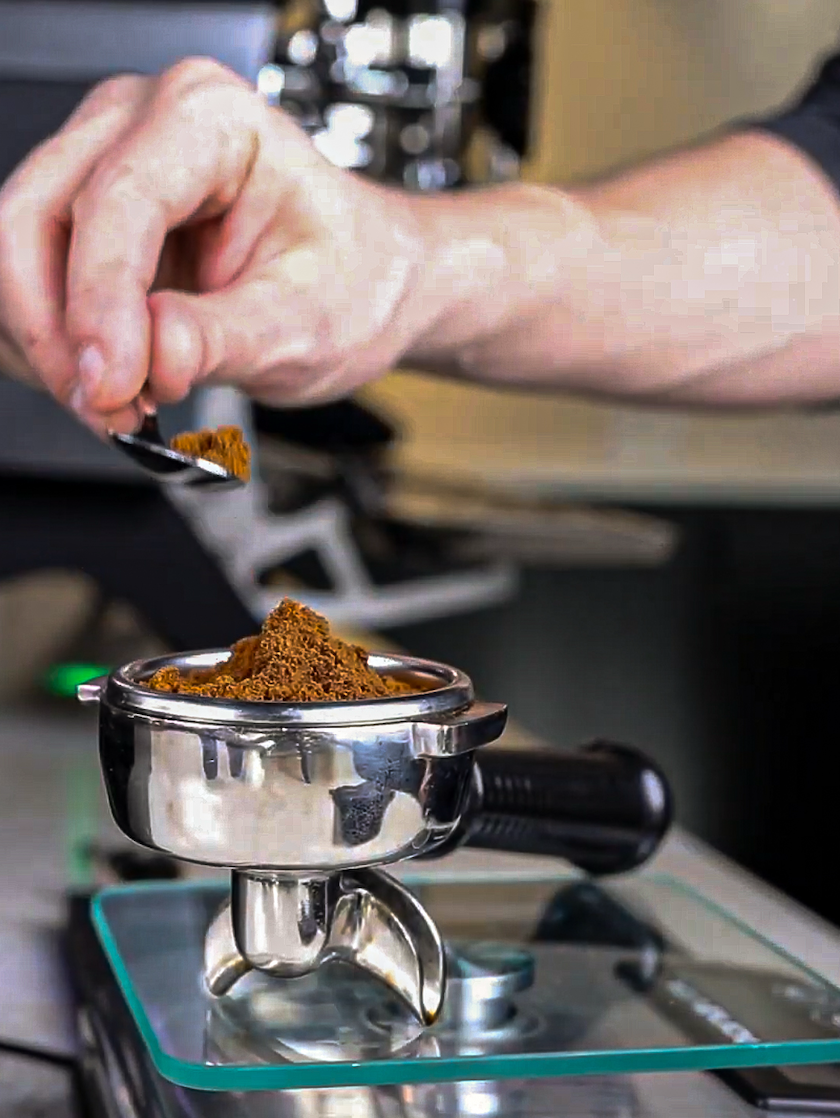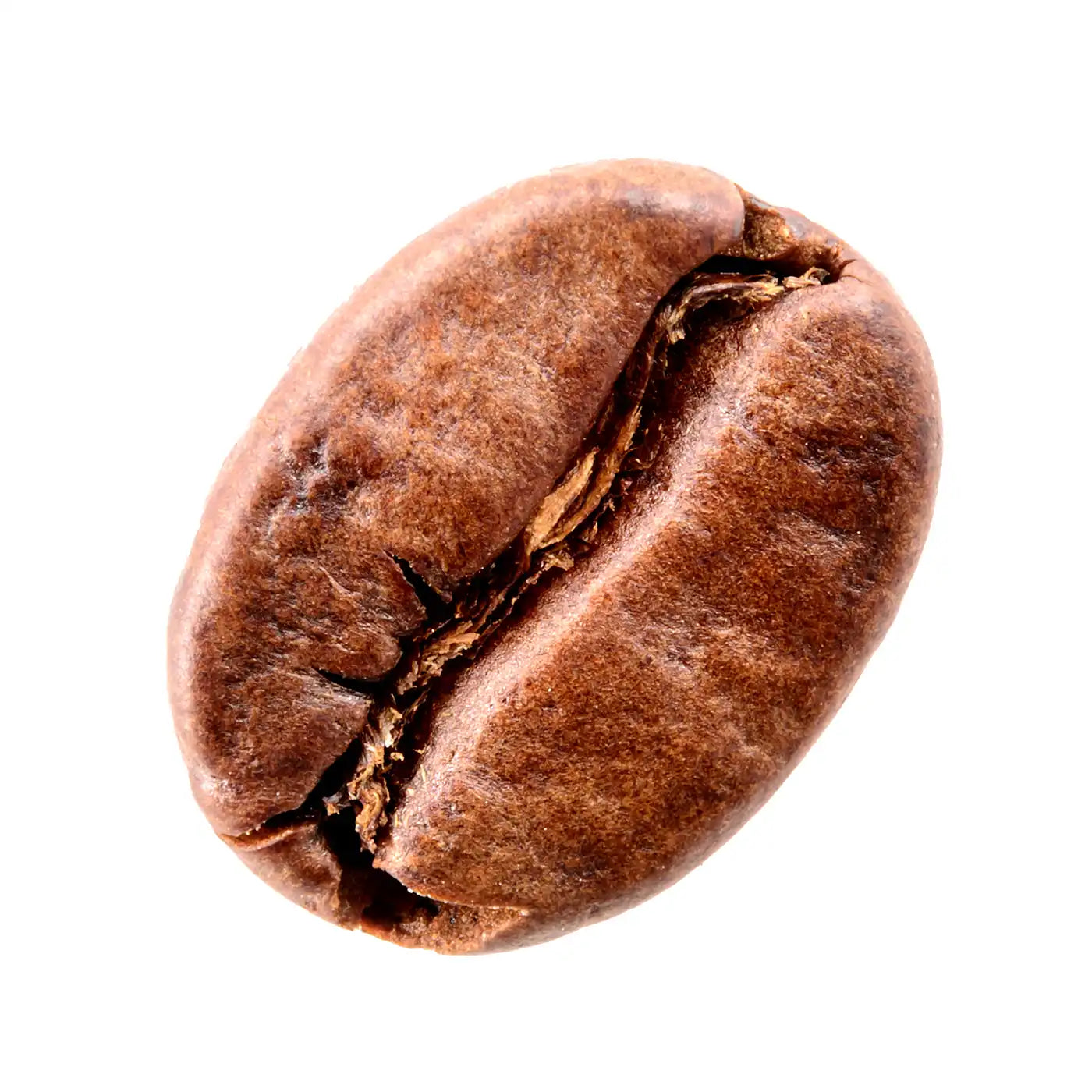This page is only visible to certain customer accounts.
Contact the store owner for more information.
We continue with La Catarata as a permanent part of our selection and there is a reason for that: It is just extremely good! Café Rivense has a very fine feel for this coffee, and the new harvest is in many ways similar to the successful 2022 harvest, simply with new nuances. In addition to the familiar notes of figs and cherries, you can now also sense chocolate and caramel in the coffee.
We recommend that you give the coffee a rest period of 2-4 weeks after roasting. Here you will experience that the taste and aroma of the coffee has opened up.
La Catarata - The Competition Coffee
We chose to enter La Catarata for the Brewers Cup 2022. Of course, you should not be robbed of the brewing guide we used for the competition:
- 18 grams of coffee for 300 grams of water.
- A bloom of 50 grams of water.
- First pour of 125 grams of water after 45 seconds.
- Second pour of 125 grams of water after 1:30 min.
- The total brew time 2:45 min.
- Water at 20PPM - Bloom and first pour at 94 Celsius and the last pour at 92 Celsius.
- Grind size 700 microns using the Bentwood grinder
This is now the 5th year in a row that we have La Catarata in our selection. The taste is intense and deep, but at the same time super balanced. In particular, the taste of pineapple and cherry is evident, along with the deep sweetness from the honey processing.
The coffee is very special to us because we love the close collaboration, the transparency, and the dialogue that occurs when you deal directly with the coffee farmer. Yes, on top of that it's also quite special because it tastes delicious!
The Coffee
The coffee beans are picked when they are ripe and then dried on raised beds. The coffee is processed according to the method called Black Honey. This means that the skin of the berry itself has been removed, but the sugar layer (mucilage) is retained. Mucilage has a golden color, is sweet and sticky, hence the name "honey processed."
No water is used in the processing of the cherries, and as the beans dry in the sun encased in their own natural layer of sugar, they only get better. Black Honey processed coffee is usually known for its great sweetness, good mouthfeel and flavourful impression.
The Farm
Café Rivense del Chirripó was founded in the 1940s by Ricardo's great-grandparents. Today it is run by Ricardo, his father Régulo and his brother Esteban. The family-owned farm did not have much tailwind from the start, where factors such as low market prices, lack of information about coffee production and financing in the area played a big role for the family. The family had recently settled in the region and outsiders predicted the project would fail.
Fortunately, it didn't work out that way; the family's hard work bore fruit, and in 2019 one of the farm's micro lots became no. 5 in the Cup of Excellence Costa Rica – which was the first time a coffee from the Chirripó region ended up in the COE Top 10.
In addition to growing really good coffee, great consideration is also given to the environment on the farm. Here, the family has managed to create a sustainable system where reducing the farm's CO2 emissions is paramount. On the farm, no water is used for the processing itself, and the water that is used is not led irresponsibly into nature. The farm is located between two nature reserves, so it is important that water is taken care of.
The family uses as little fertiliser as possible, and instead of regular fertiliser, they use natural fertiliser in the form of the residual products from the coffee. In this way, it all forms part of a circular and natural process.
Costa Rica
Costa Rica is the only country in the world where it is decidedly illegal to grow anything other than Arabica coffee. This was established by law in 1989 because Costa Rica wanted to ensure that farmers did not plant low quality coffee varieties. In this way, the government hoped to motivate the farmers to strive to grow coffee of the highest quality. It has actually succeeded very well. Of course, not all coffee from Costa Rica is equally good but in general, coffee from Costa Rica is known to be of very high quality.
Coffee made its way into Costa Rica in the 1700s and in 1829 the income from coffee exports exceeded the income the country had from tobacco and sugar cane. The government saw the potential and started giving free land to farmers to grow coffee. This caused production to explode.
In the beginning, Costa Rica exported their coffee to Chile and Panama from where the coffee was sold under the name Café Chileno de Valparaíso. The coffee was primarily sold to Great Britain, which therefore began to buy the coffee directly from Costa Rica instead.
The export of coffee has helped to ensure the country a "rich" middle class, which means that the standard of living is generally better in Costa Rica than the countries that lie around them.
This can be seen, among other things, in the fact that there has been no civil war in the country since 1948. This also means that the country no longer has a unified military. There are small independent units that ensure compliance with legislation.
The budget that was previously used to run the military was and still is redistributed to promote education and culture. This has had a major impact on the higher standard of living and the general higher level of education that we see in Costa Rica.
Direct Trade
Why trade directly? Because the farmer is the most important part of the entire chain from bean to cup. Without their work, we would not have the opportunities to roast the fantastic coffees that find their way to our roastery!
In part, it is ethically most important for us to ensure that the coffee farmer gets the payment for his work that he and his employees deserve – and that they need to be able to continue developing these fantastic coffees. When we deal and communicate directly, we help to guarantee that part of the profit for the hard work they do goes to the pickers and the owners of the coffee farm.
Roasting style
Good coffee starts with fresh beans. The beans must be of high quality and gently roasted, so that the sweetness and characteristic flavour of the beans is preserved. Our coffees are from micro lots all over the world, carefully selected and gently profile roasted lightly. We omni-roast all our coffees, so you can brew them as pour-over, filter coffee and espresso, exactly as you wish.
The coffee is always freshly roasted. We recommend that you let the coffee develop for 14 days before you start brewing it. The coffee gets even better after 3-4 weeks from the roasting date. You get fantastic flavours regardless of whether you brew pour-over, filter coffee, espresso or flat whites and cafe lattes.
Our price
We have paid $9.09/kg to the Ureña family and Café Rivense del Chirripó (FOB).
The market price at the time of the contract was $4.57/kg.
In this case, we have thus paid 99% above the market price for this coffee.
- Origin: Costa Rica
- Region: Chirripo
- Washing station: Café Rivense del Chirripó
- Variety: Red Catuaí
- Process: Black Honey
- Altitude: 1600 masl
- Harvest: April 2023
- Notes: Balanced and complex with notes of pineapple, cherry, caramel and milk chocolate.
Typical delivery: 1-2 business days
Typical delivery: 1-2 business days
4.9 ★★★★★ on Trustpilot
4.9 ★★★★★ on Trustpilot
Pay with Mobilepay
Pay with Mobilepay
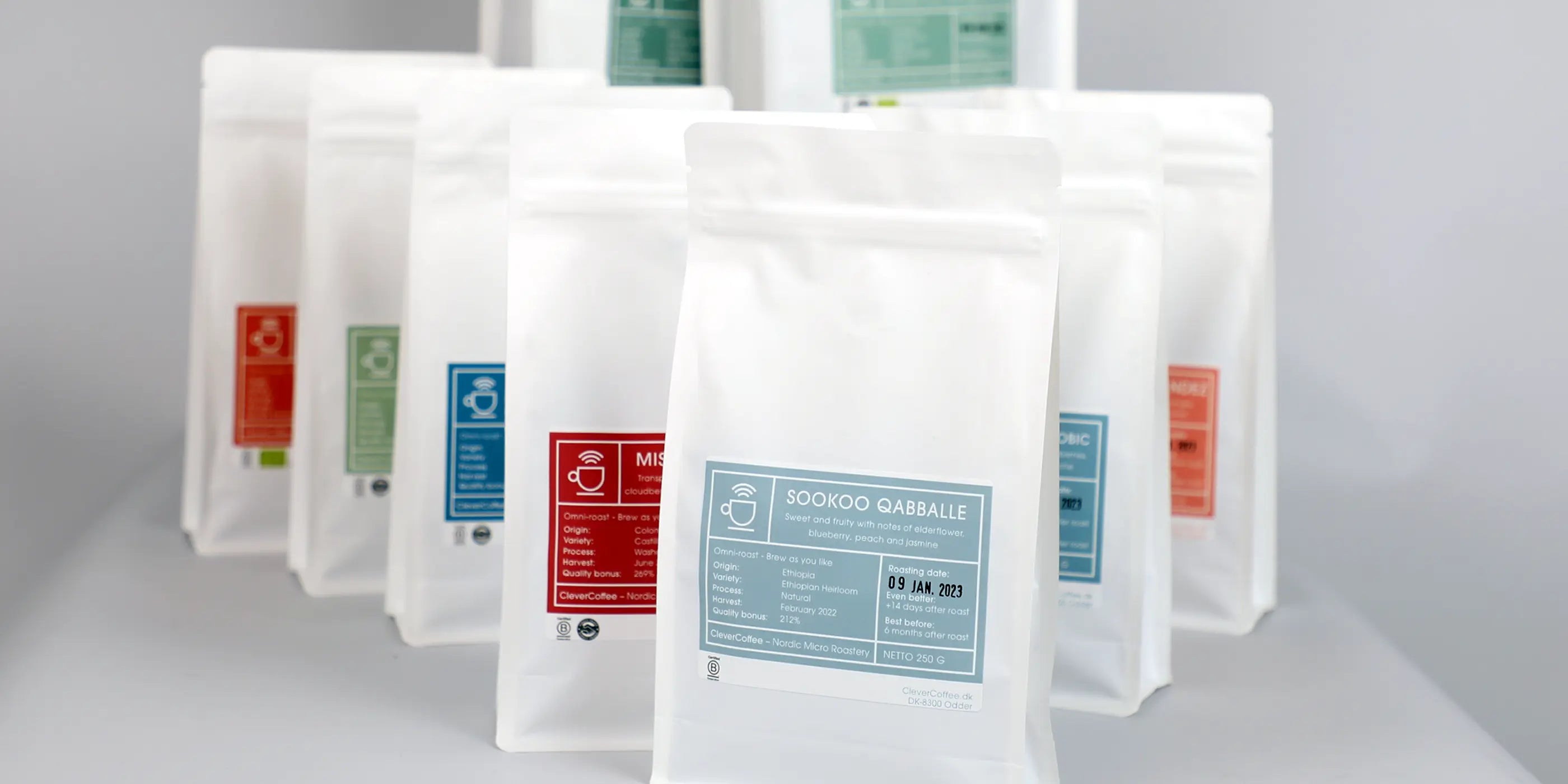
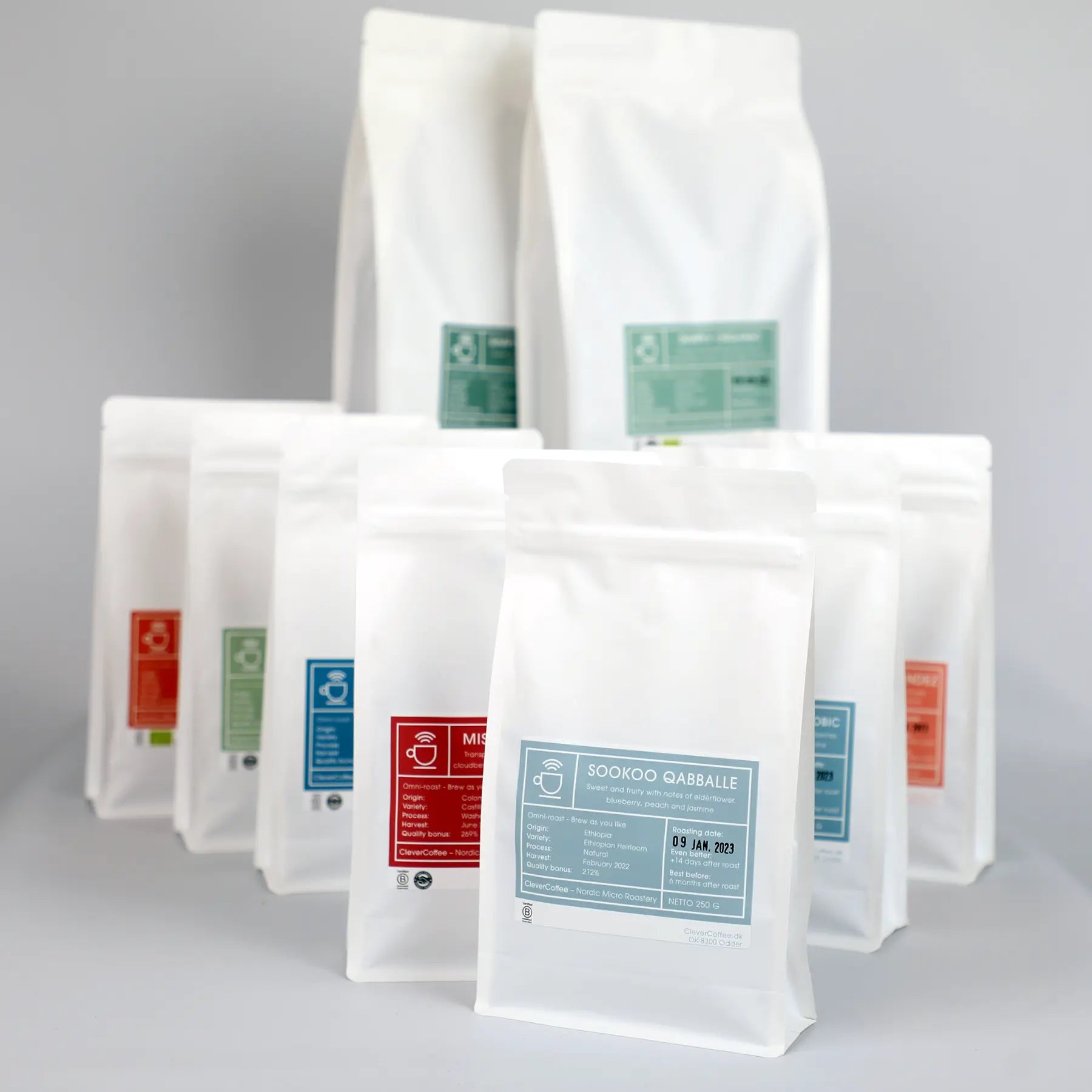
Taste the World
Coffee on Subscription
Get a new freshly roasted coffee delivered to your door every single month and get access to exclusive releases.

